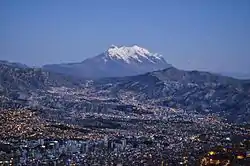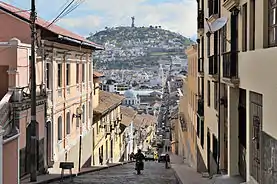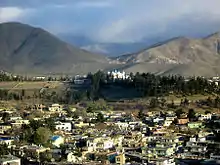List of capital cities by elevation
This is a list of national capitals ordered by elevation. Higher elevations typically have social, economic, and architectural effects on cities, in particular colder temperatures in winter. Low elevation cities are often seaports or are close to the sea.
The first country on the main list, Bolivia, is a country with multiple capitals; La Paz is the seat of the government while Sucre is the constitutional capital. If La Paz is considered the national capital, then it is ranked number one on the list. However, if Sucre is specified, then Ecuador's capital, Quito, is the national capital at the highest elevation.
The second list below contains several states with limited recognition.
List
Member and observer states of the United Nations
Other states (including de facto independent states, autonomous region and dependencies)
See also
Notes
- Kosovo is the subject of a territorial dispute between the Republic of Kosovo and the Republic of Serbia. The Republic of Kosovo unilaterally declared independence on 17 February 2008. Serbia continues to claim it as part of its own sovereign territory. The two governments began to normalise relations in 2013, as part of the 2013 Brussels Agreement. Kosovo is currently recognized as an independent state by 99 out of the 193 United Nations member states. In total, 113 UN member states recognized Kosovo at some point, of which 14 later withdrew their recognition.
- The State of Palestine (according to the Basic Law of Palestine, Title One: Article 3) regards Jerusalem as its capital. But the documents of the PLO's Negotiations Affairs Department (NAD) often refer to East Jerusalem (rather than the whole of Jerusalem) as a future capital, and sometimes as the current capital. One of its 2010 documents, described as "for discussion purposes only", says that Palestine has a '"vision"' for a future in which "East Jerusalem ... shall be the capital of Palestine, and West Jerusalem shall be the capital of Israel",[1] and one of its 2013 documents refers to "Palestine's capital, East Jerusalem", and states that "Occupied East Jerusalem is the natural socio-economic and political center for the future Palestinian state", while also stating that "Jerusalem has always been and remains the political, administrative and spiritual heart of Palestine" and that "The Palestinian acceptance of the 1967 border, which includes East Jerusalem, is a painful compromise".[2]
- See: List of states with limited recognition.
- In 1949, the Republic of China government led by the Kuomintang (KMT) lost the Chinese Civil War to the Communist Party of China (CPC) and set up a provisional capital in Taipei, which serves as the seat of government to this day. The CPC established the People's Republic. As such, the political status of the ROC and the legal status of Taiwan (alongside the territories under ROC jurisdiction) are in dispute. In 1971, the United Nations gave the China seat to the PRC instead of the ROC: most states recognize the PRC to be the sole legitimate representative of all China, and the UN classifies Taiwan as "Taiwan, Province of China". The ROC has de facto relations with most sovereign states. A significant political movement within Taiwan advocates Taiwan independence.
References
- PLO-NAD, June 2010, Jerusalem Non-Paper Archived 4 March 2016 at the Wayback Machine on Statements and Speeches Archived 24 June 2013 at Archive.today, nad-plo.org; accessed 25 November 2014. Extracts from page 2:"This paper is for discussion purposes only. Nothing is agreed until everything is agreed.
Palestinian vision for Jerusalem
...
Pursuant to our vision, East Jerusalem, as defined by its pre-1967 occupation municipal borders, shall be the capital of Palestine, and West Jerusalem shall be the capital of Israel, with each state enjoying full sovereignty over its respective part of the city." - PLO-Negotiations Affairs Department (NAD), August 2013, East Jerusalem today – Palestine's Capital: The 1967 border in Jerusalem and Israel's illegal policies on the ground Archived 4 March 2016 at the Wayback Machine, nad-plo.org; accessed 25 November 2014, Quotes:" ... Palestine's capital, East Jerusalem ... The Palestinian acceptance of the 1967 border, which includes East Jerusalem, is a painful compromise: ... Jerusalem has always been and remains the political, administrative and spiritual heart of Palestine. Occupied East Jerusalem is the natural socio-economic and political center for the future Palestinian state."
This article is issued from Wikipedia. The text is licensed under Creative Commons - Attribution - Sharealike. Additional terms may apply for the media files.





.jpg.webp)

